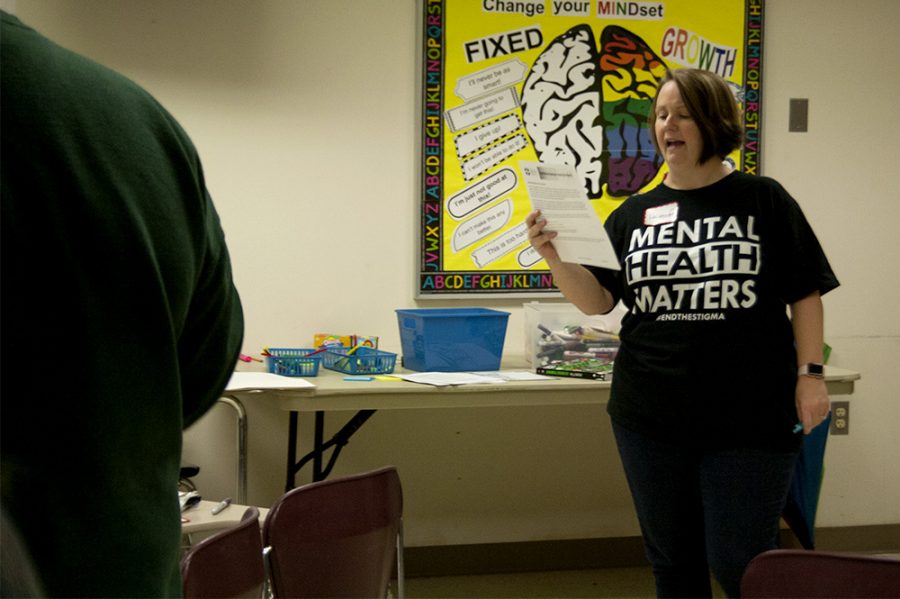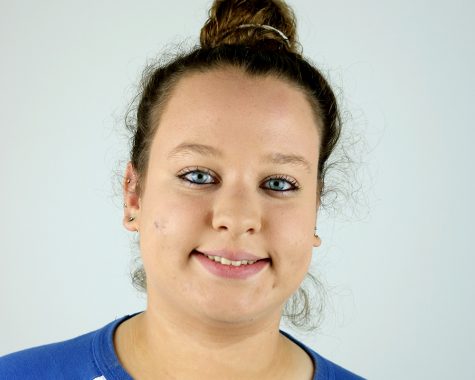Students train for Youth Mental Health First Aid
Dr. Kathryn Havercroft is one of the people teaching Youth Mental Health First Aid Training which was held on Friday, October 26, 2018 in Buzzard Hall.
October 28, 2018
A youth mental health first aid training on Friday aimed to certify attendees as Youth Mental Health First Aid responders.
Special education professors Melissa Jones-Bromenshenkel and Kathryn Havercroft led the training.
Havercroft said this training is getting increasingly important for students who wish to work with adolescents, or students between the ages of 12 and 18, once they graduate.
“For future educators, or anyone who is going to work with adolescents and youth, we are seeing a rise, or at least recognizing a rise, in mental health needs of that population,” Havercroft said. “Individuals are not prepared to address when a mental health situation or crisis comes up, that training is not provided really anywhere else in teacher preparation programming, so we want to make sure (students) are prepared when they get into schools.”
Jones-Bromenshenkel said some states have started requiring a training like this one before students are allowed to exit a teacher preparation program.
The training Havercroft and Jones-Bromenshenkel use is part of an international training program, which includes a 100-slide presentation and different activities scattered throughout the day.
Eastern was able to provide this training free of cost to students through a federal grant called Illinois Project AWARE.
According to the mental health first aid website, a training like this is important for everyone as people often are not sure how to respond to issues of mental health.
“Most of us would know how to help if we saw someone having a heart attack — we’d start CPR, or at the very least, call 9-1-1. But too few of us would know how to respond if we saw someone having a panic attack or if we were concerned that a friend or co-worker might be showing signs of alcoholism,” the website said.
The action plan that the training teaches is the acronym ALGEE, which stands for: Access for suicide risk or harm, Listen nonjudgmentally, Give resources and information, Encourage appropriate professional help and Encourage self-help and other support strategies.
Havercroft said trainings like this one exist elsewhere, and students should be on the lookout for them.
“I think (students) should seek out this type of training outside of university — their red crosses, their police departments, their churches, their youth organizations — that do it,” Havercroft said. “They can go to the (mental health first aid) website and see what’s in their area, and I think anyone who is going to work with adolescents should seek out this type of training or something similar.”
The adolescent version of this training is only one type of module that exists, Havercroft said, with programs being out there that aim specifically toward college-aged students, one that focuses on adults, one for veterans and more that are currently being developed.
“There are lots of options, so no matter what your field is going to be, seeking out training for recreational activities, church activities, having this training can really support anyone,” she said.
After attending the eight-hour training, Jones-Bromenshenkel said students left Friday with a certification card.
“(Students who complete the training) do … get to carry a card, it’s like a first aid card, so not only are they certified, they have the proof of that,” Jones-Bromenshenkel said. “We’re hoping that employers recognize (the certification) as something positive that (students) come with (and) maybe not everyone has that background.”
Brooke Schwartz can be reached at 581-2812 or at [email protected].





















































